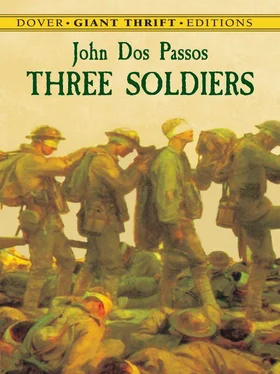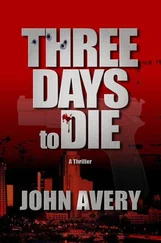“Yes, I suppose you are right… for you that is. The artist should be free from any sort of entanglement.”
“I don’t see what difference there is between an artist and any other sort of workman,” said Andrews savagely.
“No, but look.”
From the square where they stood, above the green blur of a little park, they could see the cathedral, creamy yellow and rust color, with the sober tower and the gaudy tower, and the great rose window between, the whole pile standing nonchalantly, knee deep in the packed roofs of the town.
They stood shoulder to shoulder, looking at it without speaking.
In the afternoon they walked down the hill towards the river, that flowed through a quarter of tottering, peak-gabled houses and mills, from which came a sound of grinding wheels. Above them, towering over gardens gardens full of pear trees in bloom, the apse of the cathedral bulged against the pale sky. On a narrow and very ancient bridge they stopped and looked at the water, full of a shimmer of blue and green and grey from the sky and from the vivid new leaves of the willow trees along the bank.
Their senses glutted with the beauty of the day and the intricate magnificence of the cathedral, languid with all they had seen and said, they were talking of the future with quiet voices.
“It’s all in forming a habit of work,” Andrews was saying. “You have to be a slave to get anything done. It’s all a question of choosing your master, don’t you think so?”
“Yes. I suppose all the men who have left their imprint on people’s lives have been slaves in a sense,” said Geneviève slowly. “Everyone has to give up a great deal of life to live anything deeply. But it’s worth it.” She looked Andrews full in the eyes.
“Yes, I think it’s worth it,” said Andrews. “But you must help me. Now I am like a man who has come up out of a dark cellar. I’m almost too dazzled by the gorgeousness of everything. But at least I am out of the cellar.”
“Look, a fish jumped,” cried Geneviève.
“I wonder if we could hire a boat anywhere… Don’t you think it’ld be fun to go out in a boat?”
A voice broke in on Geneviève’s answer:
“Let’s see your pass, will you?”
Andrews turned round. A soldier with a round brown face and red cheeks stood beside him on the bridge. Andrews looked at him fixedly. A little zigzag scar above his left eye showed white on his heavily tanned skin.
“Let’s see your pass,” the man said again; he had a high pitched, squeaky voice.
Andrews felt the blood thumping in his ears.
“Are you an M.P.?”
“Yes.”
“Well I’m in the Sorbonne Detachment.”
“What the hell’s that?” said the M.P., laughing thinly.
“What does he say?” asked Geneviève, smiling.
“Nothing. I’ll have to go see the officer and explain,” said Andrews in a breathless voice. “You go back to your Aunt’s and I’ll come as soon as I’ve arranged it.”
“No, I’ll come with you.”
“Please go back. It may be serious. I’ll come as soon as I can,” said Andrews harshly.
She walked up the hill with swift decisive steps, without turning round.
“Tough luck, buddy,” said the M.P. “She’s a goodlooker. I’d like to have a half-hour with her myself.”
“Look here. I’m in the Sorbonne School Detachment in Paris, and I came down here without a pass. Is there anything I can do about it?”
“They’ll fix you up, don’t worry,” cried the M.P. shrilly. “You ain’t a member of the General Staff in disguise, are ye? School Detachment! Gee, won’t Bill Huggis laugh when he hears that? You pulled the best one yet, buddy… But come along,” he added in a confidential tone. “If you come quiet I won’t put the handcuffs on ye.”
“How do I know you’re an M.P.?”
“You’ll know soon enough.”
They turned down a narow street between grey stucco walls leprous with moss and water stains.
At a chair inside the window of a small wine shop a man with a red M.P. badge sat smoking. He got up when he saw them pass and opened the door with one hand on his pistol holster.
“I got one bird, Bill,” said the man, shoving Andrews roughly in the door.
“Good for you, Handsome; is he quiet?”
“Um.” Handsome grunted.
“Sit down there. If you move you’ll git a bullet in your guts.” The M.P. stuck out a square jaw; he had a sallow skin, puffy under the eyes that were grey and lustreless. “He says he’s in some goddam School Detachment. First time that’s been pulled, ain’t it?”
“School Detachment. D’you mean an O.T.C.?” Bill sank laughing into his chair by the window, spreading his legs out over the floor.
“Ain’t that rich?” said Handsome, laughing shrilly again.
“Got any papers on ye? Ye must have some sort of papers.”
Andrews searched his pockets. He flushed.
“I ought to have a school pass.”
“You sure ought. Gee, this guy’s simple,” said Bill, leaning far back in the chair and blowing smoke through his nose.
“Look at his dawg-tag, Handsome.”
The man strode over to Andrews and jerked open the top of his tunic. Andrews pulled his body away.
“I haven’t got any on. I forgot to put any on this morning.”
“No tag, no insignia.”
“Yes, I have, infantry.”
“No papers… I bet he’s been out a hell of a time,” said Handsome meditatively.
“Better put the cuffs on him,” said Bill in the middle of a yawn.
“Let’s wait a while. When’s the loot coming?”
“Not till night.”
“Sure?”
“Yes. Ain’t no train.”
“How about a side car?”
“No, I know he ain’t comin’,” snarled Bill.
“What d’you say we have a little liquor, Bill? Bet this bloke’s got money. You’ll set us up to a glass o’ cognac, won’t you, School Detachment?”
Andrews sat very stiff in his chair, staring at them.
“Yes,” he said, “order up what you like.”
“Keep an eye on him, Handsome. You never can tell what this quiet kind’s likely to pull off on you.”
Bill Huggis strode out of the room with heavy steps. In a moment he came back swinging a bottle of cognac in his hand.
“Tole the Madame you’d pay, Skinny,” said the man as he passed Andrews’s chair. Andrews nodded.
The two M.P.’s drew up to the table beside which Andrews sat. Andrews could not keep his eyes off them. Bill Huggis hummed as he pulled the cork out of the bottle.
Handsome watched him, grinning.
Suddenly they both burst out laughing.
“An’ the damn fool thinks he’s in a school battalion,” said Handsome in his shrill voice.
“It’ll be another kind of a battalion you’ll be in, Skinny,” cried Bill Huggis. He stifled his laughter with a long drink from the bottle.
He smacked his lips.
“Not so goddam bad,” he said. Then he started humming again:
“Have some, Skinny?” said Handsome, pushing the bottle towards Andrews.
“No, thanks,” said Andrews.
“Ye won’t be gettin’ good cognac where yer goin’, Skinny, not by a damn sight,” growled Bill Huggis in the middle of a laugh.
“All right, I’ll take a swig.” An idea had suddenly come into Andrews’s head.
“Gee, the bastard kin drink cognac,” cried Handsome.
“Got enough money to buy us another bottle?”
Andrews nodded. He wiped his mouth absently with his handkerchief; he had drunk the raw cognac without tasting it. “Get another bottle, Handsome,” said Bill Huggis carelessly. A purplish flush had appeared in the lower part of his cheeks. When the other man came back, he burst out laughing.
“The last cognac this Skinny guy from the school detachment’ll git for many a day. Better drink up strong, Skinny… They don’t have that stuff down on the farm… School Detachment; I’ll be goddamned!” He leaned back in his chair, shaking with laughter.
Читать дальше












